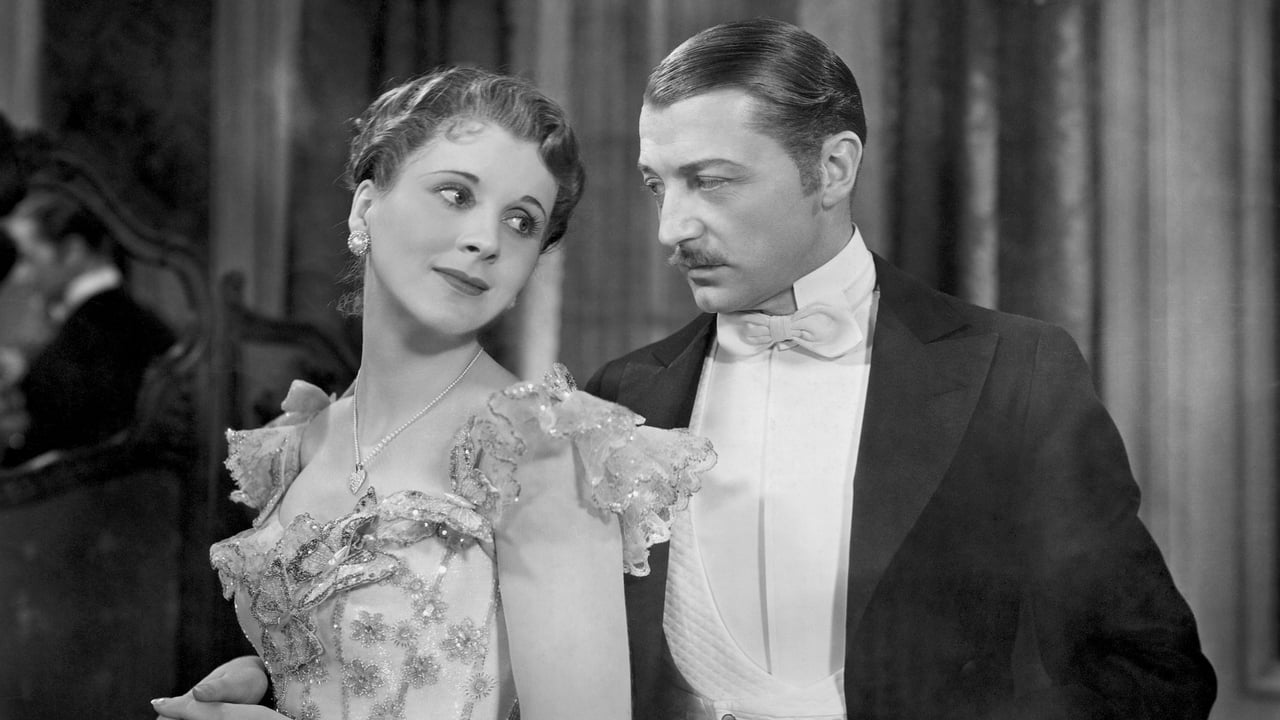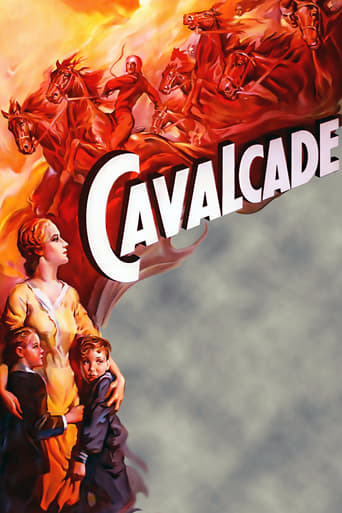SpuffyWeb
Sadly Over-hyped
SoftInloveRox
Horrible, fascist and poorly acted
LouHomey
From my favorite movies..
Hot 888 Mama
. . . since Germany had, with ALL QUIET ON THE WESTERN FRONT, the ONLY foreign movie ever to win the "Best Picture" Oscar (1930). Or perhaps WINGS "started the fire," as the first claimant of this top prize in 1928. But both of these "best pictures" focused on WWI (or "the Great War," as it was called until the 1940s), while the 1933 top Oscar winner, CAVALCADE, is far more diffuse, covering 33 years of British history and even throwing in the kitchen sink! Yes, CAVALCADE is the template for PBS' perennial TV favorites, UPSTAIRS DOWNSTAIRS and DOWNTON ABBEY. As Billy Joe realized when he wrote his #1 hit in 1989 cataloging 119 items of mental furniture for the late Beatnik and early Baby Boomer Generations, a montage of headlines can be enough to create quite sentimental Art, reminding your "target audience" of its Youth. CAVALCADE is quite upfront about its intentions, daring viewers to observe a family (no doubt like themselves--in 1933, that is; AND, you have to count the servants, of course, for the realists in the audience) buffeted by "the cavalcade of the New 20th Century." Why not give household members tickets to the Boer War in South Africa, a place at the front of Queen Victoria's funeral cortège, a space at the railing on the Titanic, a white cross in a WWI cemetery, a knighthood, a showgirl, and a champagne toast on two New Year's Eves to bracket everything else? There's a continuing motif here of "ghost riders in the sky," presumably to symbolize the passing cavalcade of this flick's title. Though it is up to History to determine whether this movie OR Billy Joel's ode will be meaningful at the NEXT turn of a century (when everyone with a living memory of the events of either may have passed on), the superimposed battle sequences of WWI in CAVALCADE are among the most stirring martial art ever presented on screen.
ActionFigure
CALVACADE "1933"Calvacade needs to be a necessary film for anyone into film history. Starting off with a Vaudville story-line it quickly becomes a lesson in film and screenplay history. Originally a story by Noel Coward, the screenplay is sharp and directive. Scenes are well-thought out and dialogue becomes a crucial focus. The performances age with all the makeup, but it's charming. I'd watch it again. Many times.TCM brings it again. Highly recommended.
mikegordan
For those of you keeping up with my retrospective on all the Best Picture winners up to now, you will know these writers, directors and actors were still not accustomed to the transition to talkies, but they were slowly getting the hang of it. And on top of it all, they were even taking advantage of the visual medium. The sets, the ability to shoot on location, the cinematography, the lighting, and down the road, the color of the film itself all helped contribute all kinds of creative ways for these filmmakers to either make the impossible possible, or reliving the past. King Kong, a film that came out in 1933, is one of those films that accomplished this task and so much more.But unfortunately, we're not reviewing King Kong today because it didn't win Best Picture. It wasn't even nominated. What won instead, unfortunately, was a film that made no attempt at all to take advantage of what film as a medium has to offer; Cavalcade. Yeah, they adapted one of the drollest of plays into a feature film, and people actually loved it.What's the story? It's the life of an English couple from the New Years Eve of 1899 up until then-present day 1933 as they experience historical events include the Second Boer War, the death of Queen Victoria, the sinking of the Titanic, and World War I among many other things. And within the now-reasonably short running time of 110 minutes, then that means the film's going to be either exciting or rushed. This film is anything but exciting; it's dull as a rock. There is absolutely no soul in this picture at all.And the picture is indeed rushed. These events are just glanced over for no good reason other than to show that they lived through them, and they never seem to show how much they impacted them or the world around them. There's nothing interesting about these characters or this story whatsoever. And what's worse is that these events don't seem to impact the viewer in any way because those scenes are executed in a manner identical to those of a play; you never see these events happen. Come, on! We already had 2 War films win Best Picture in the past; where's the budget? Where are the calamities? For a sentimental film, this film sure does feel devoid of any real emotions.And that's why I call this film dull and soulless; there's no logic or reason, no critical thinking, not even pure sentimental hogwash. At least all the previous nominees had a semblance of a soul; this film doesn't. This film is completely static and unmoving to say the least. The acting is boring, the characters are boring, and the story is boring. There is nothing positive to say outside of the fact that the premise had promise. More extravagance (to help these events leave a bigger impact), about 20 or 30 more minutes added to the running time, and more interesting characters. That is all that is needed to make this film any good. So while the film is pretty bad, it is salvageable. I would just skip it if I were you. 2.5 out of 10 rounded up to 3 out of 10.
gort-8
This is a letter perfect film taking in the sweep of time from 1900-1933 for a British upper-class family (the Marryots) and a family that serves them (the Bridges).If you enjoyed Cavalcade you might want to see the 1944 film, This Happy Breed. I think of the two as companion pieces.Cavalcade looked took an Upstairs-Downstairs approach, showing families at either end of the economic and class scale, from 1900-1933. This Happy Breed focuses on the Gibbons, a middle-class family, beginning with the end of the Great War to the start of World War II. It was the second film directed by David Lean.The movies common ancestor is Noel Coward. Both films adapted from plays written by him.

